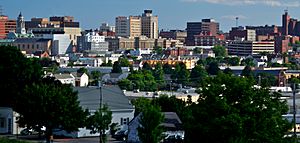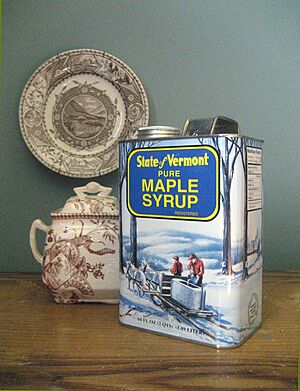Economy of New England facts for kids
New England is a special part of the United States. It's a bit far from the middle of the country, not very big, but lots of people live there. This region was where the Industrial Revolution first started in the U.S. – that's when factories and machines became super important! Later, it was also one of the first places to see factories close down. But today, New England is a big center for education, new technology, money matters (finance), and medicine.
Contents
What Makes New England Special?
New England has always been important for making things in factories and for its natural resources. Think of things like strong granite stone, tasty lobster, and lots of codfish.
Most people in New England live near the coast or in the southern states. They feel a strong connection to their region. The very first textile (cloth-making) factory in America, called the Slater Mill, started along the Blackstone River in Pawtucket, Rhode Island.
In the early 1900s, many traditional factories, like those making clothes and furniture, started to move to other parts of the U.S., like the Midwest and the South. This was a time when New England lost many of its old industries. But by the middle and late 1900s, new types of jobs grew. These included high-tech companies (making computers and electronics), military defense, finance (like banks and insurance), and important services like education and health care.
In 2007, if you added up all the money made by businesses in New England (called the Gross State Product), it was about $763.7 billion. Massachusetts made the most money ($365 billion), and Vermont made the least ($25.4 billion).
What New England Sells to Other Places

New England mostly sells industrial products, which are things made in factories. This includes special machines and weapons, like aircraft and missiles. These are built by the region's well-educated workers. About half of everything New England exports is industrial and commercial machinery, such as computers and electronic equipment. When you add instruments, chemicals, and transportation equipment, it makes up about three-quarters of all exports.
You can find granite being dug up in Barre, Vermont. Guns are made in Springfield, Massachusetts, and Saco, Maine. Boats are built in Groton, Connecticut, and Bath, Maine. Hand tools come from Turners Falls, Massachusetts. The insurance business is also very big around Hartford, Connecticut.

New England also exports food! This includes fish, lobster, cranberries, potatoes from Maine, and sweet maple syrup. The service industry, which means jobs that provide help or entertainment, is also very important. This includes tourism (people visiting), education, financial services (like banking), insurance, and building services. The U.S. government has even said that New England's economy is like a small example of the entire U.S. economy.
Making Things (Manufacturing)
A study in 2010 showed that making things in New England is generally more expensive than in most other parts of the U.S. Only Maine was less costly. Vermont, Rhode Island, and New Hampshire were the most expensive. Because of this, old factory buildings in cities like Lowell, Massachusetts, are now being used for homes and shops instead of factories.
Farming (Agriculture)
Farming in New England is a bit tricky because the soil is rocky, the climate is cool, and there isn't a lot of flat land. However, some New England states are very good at producing certain farm products. Maine is one of the top states for aquaculture (farming fish and seafood). It also has many potato fields in its northeast part. Vermont is a big producer of dairy products (like milk and cheese). Connecticut and Massachusetts are known for growing tobacco. You'll find lots of cranberries growing in the Cape Cod area of Massachusetts, and blueberries in Maine.
How New England Gets Its Energy
New England is pretty good at using energy wisely compared to the rest of the U.S. Most states here are among the most energy-efficient. However, electricity prices in New England are also among the highest in the country.
Three of the six New England states use a lot of nuclear power for their electricity. Vermont gets the most from nuclear power (73.7%), followed by Connecticut (48.9%), and New Hampshire (46%).
Jobs in Each State
Here's a quick look at how many people were looking for jobs (unemployment rates) in New England compared to the whole U.S. in recent years:
| Employment Area | October 2010 | October 2011 | October 2012 | Net change |
|---|---|---|---|---|
| United States | 9.7 | 9.0 | 7.9 | −1.8 |
| New England | 8.3 | 7.6 | 7.4 | −0.9 |
| Connecticut | 9.1 | 8.7 | 9.0 | −0.1 |
| Maine | 7.6 | 7.3 | 7.4 | −0.2 |
| Massachusetts | 8.3 | 7.3 | 6.6 | −1.7 |
| New Hampshire | 5.7 | 5.3 | 5.7 | 0.0 |
| Rhode Island | 11.5 | 10.4 | 10.4 | −1.1 |
| Vermont | 5.9 | 5.6 | 5.5 | −0.4 |
In October 2011, the area with the fewest people looking for jobs was Burlington-South Burlington, Vermont, with only 3.6% unemployment. The area with the most people looking for jobs was Lawrence-Methuen-Salem (in Massachusetts and New Hampshire), with 12.4% unemployment.
Taxes
A study from 2005 to 2008 showed that Rhode Island, Connecticut, and New Hampshire had some of the highest property taxes in the country. Property taxes are what homeowners pay based on the value of their homes. However, New Hampshire is special because it doesn't have a sales tax (a tax you pay when you buy things) or an income tax (a tax on the money you earn).
In 2010, most New England states had higher state and local tax burdens than the U.S. average, according to the Tax Foundation. But the study also said that the tax burdens across all states are actually quite similar. Even with these taxes, Connecticut, Massachusetts, and New Hampshire are among the wealthiest states in the U.S. Connecticut was even ranked as the richest state!

